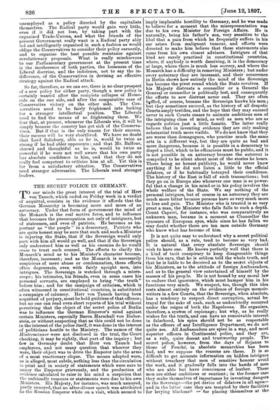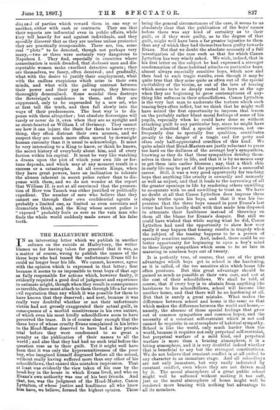THE SECRET POLICE IN GERMANY.
TO our minds the great interest of the trial of Herr von Tausch, which ended on Friday week in a verdict of acquittal, consists in the evidence it affords that the German Monarchy is becoming more and more of an autocracy. Under that form of government the mind of the Monarch is the real motive force, and to influence that becomes the preoccupation not only of intriguers, but of statesmen, and even of patriots. He becomes as im- portant as "the people" in a democracy. Patriots who are quite honest may be sure that such and such a Minister is injuring the State, that if the Sovereign would only part with him all would go well, and that if the Sovereign only understood him as well as his enemies do he would cease to trust such counsel. The efforts to clarify the Monarch's mind as to his Minister's character become, therefore, incessant; and as the Monarch is necessarily suspicious of mere abuse or condemnation, these efforts often degenerate, even with fairly upright men, into intrigues. The Sovereign is watched through a micro- scope ; his intimates, his friends, even in some cases his personal servants, are employed to bring "the truth" before him ; and for the campaign of criticism, which is often witnessed in constitutional countries, is substitnted a campaign of calumny. Herr von Tausch having been acquitted of perjury, must be held guiltless of that offence; but no one can read even short reports of his trial without perceiving that the object of the secret police of Berlin was to influence the German Emperor's mind against certain Ministers, especially Baron Marschall von Bieber- stein, or without suspecting that as this could not be done in the interest of the police itself, it was done in the interest of politicians hostile to the Ministry. The names of the Hintermiinner were not disclosed in the trial, the Court checking, it may be rightly, that part of the inquiry ; but • few in Germany doubt that Herr von Tausch had employers, and not many question that whoever they were, their object was to drive the Emperor into the arms of a most reactionary clique. The means adopted were, as is alleged, most subtle, nothing less than the circulation in print and in society of statements which were sure to annoy the Emperor grievously, and the production of evidence calculated to raise in his mind a suspicion that the unfriendly rumours or statements were due to his own Ministers. His Majesty, for instance, was much annoyed, Justly annoyed, that an after-dinner speech was attributed to the Russian Emperor while on a visit, which seemed to imply implacable hostility to Germany, and he was made to believe for a moment that the misrepresentation was due to his own Minister for Foreign Affairs. He is naturally, being his father's son, very sensitive to the libel that a pain from which he frequently suffers in his ear arises from malignant tumour, and efforts were directed to make him believe that these statements also came from his own closest advisers. Intrigues of that kind are rarely practised in constitutional countries, where, if anybody is worth deceiving, it is the democracy at large, where there is much less secrecy, and where the Monarch has a difficulty in removing Ministers ; but under every autocracy they are incessant, and their occurrence in Berlin shows how entirely the mind of the Sovereign has become the pivot round which the State revolves. If his Majesty distrusts a counsellor or a General the General or counsellor is politically lost, and consequently the efforts to sow distrust never end. They are often Wiled, of course, because the Sovereign knows his men ; but they sometimes succeed, as the history of all despotic Courts amply testifies, and the hope that they may succeed never in such Courts ceases to animate ambitious men of the intriguing class of mind, as well as men who are as regards politics just a little fanatic. The latter really believe that in inventing evidence they are only making substantial truth more visible. We do not know that they are worse than demagogues, who practise much the same arts in a different way, but they are quite as bad and more dangerous, because it is possible in a democracy to dispel a libel, which to be efficacious must be public, and it is not possible in an autocracy because the autocrat is compelled to be silent about most of the stories he hears. There being no honest publicity, he would never know anything if he did not listen a little to the official delators, or if he habitually betrayed their confidence. The history of the East is full of such transactions ; but they go on in Europe also whenever one man is so power- ful that a change in his mind or in his policy involves the whole welfare of the State. We say nothing of the personal intrigues, but of course in an autocracy they are much more bitter because persons have so very much more to lose and gain. The Minister who is trusted is so very great a man, the Minister who falls falls to such a depth. Count Caprivi, for instance, who was comparatively an unknown man, became in a moment as Chancellor the cynosure of European eyes, while since he has fallen we may doubt whether there are ten men outside Germany who know what has become of him.
It is not quite easy to understand why a secret political police should, as a rule, tend to become so very bad. It is natural that every absolute Sovereign should wish to have one. He knows perfectly well that there is a kind of tacit conspiracy to keep disagreeable things from his ears, that he is seldom told the whole truth, and that he is liable to be deceived as to the secret objects of his Ministers, as to the attitude of foreign Ambassadors, and as to the general view entertained of himself by the masses of his people. He is not bound by any moral law to endure that ignorance, which must hamper him in his functions very much. We suspect, too, though this idea rest; almost entirely on the evidence of foreign memoir- writers in a few Courts, that the Sovereign, when absolute, has a tetidency to suspect direct corruption, actual be- trayal fOr the sake of cash, such as undoubtedly occurred under the reigns of both the Napoleons. He organises, therefore,, a system of espionage; but why, as he really wishes for the truth, and can have no conceivable interest in falsehood, his spies should not be as respectable as the officers of any Intelligence Department, we do not quite see. All Ambassadors are spies in a way, and most superior officers in Continental police, and they are, as a rule, quite decent and trustworthy people. The secret police, however, from the days of Sejanus to those of Pouch, in absolute monarchies has been bad, and we suppose the reasons are these. It is so difficult to get accurate information on hidden intrigues without treachery that men of sensitive 'honour avoid the work, and it gradually falls into the halide of men who are able but have consciences of leather. - These men are either ambitious or esurient ; in the former case they make themselves of importance by inventing dangers to the Sovereign—the pet device of delators in all ages- and in the latter case they are tempted by their facilitiess fer levying blackmail m• for placing themselves at the dist os d of parties which reward them in one way or another, either with cash or contracts. They see that their reports are influential even in public affairs, while t'aey tell heavily for and against individuals, and they speedily discover that as they are useless unless protected they are practically irresponsible. There are, too, some real " plots " to be detected, though not perhaps very many,—two or three were certainly very dangerous to Napoleon I. They find, especially in countries where assassination is much dreaded, that decktssis men and dis- reputable women make excellent detective agents ; they are themselves, we fancy, often deceived ; and gradually, what with the desire to justify their employment, what with the endless suspicions which arise in their own minds, and what with the galling contrast between their power and their pay or repute, they become thoroughly demoralised. Some scandal then destroys the Sovereign's confidence in them, and they are suppressed, only to be superseded by a new set, who at first tell the truth, and then fall slowly into the ways of their predecessors. The best way is to dis- pense with them altogether ; but absolute Sovereigns will rarely or never do it, even when they are as upright and as stout-hearted as William I. of Germany. They cannot see how it can injure the State for them to know every- thing, they often distrust their own acumen, and we suspect they are much more often moved by downright human curiosity than it is usual to acknowledge. It must be very interesting to a King to know, or think he knows, the secret history of everybody about him, and of every faction within his capital. It must be very like watching a drama upon the plot of which your own life or for- tune depends, and which may at any moment result in a success or a catastrophe. At all events Kings, when they have great powers, have an inclination to tolerate the abuses inherent in secret police rather than to dis- pense with them, and we do not wonder at the report that William II. is not at all convinced that the prosecu- tion of Herr von Tausch was either justified or politically expedient. The number of men who believe that they cannot see through their own confidential agents is probably a limited one, as limited as even novelists and dramatists think, and the King whose secret police is " exposed " probably feels as sore as the vain man who finds the whole world suddenly made aware of his false teeth.



































 Previous page
Previous page